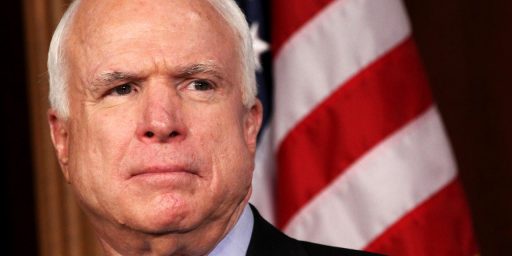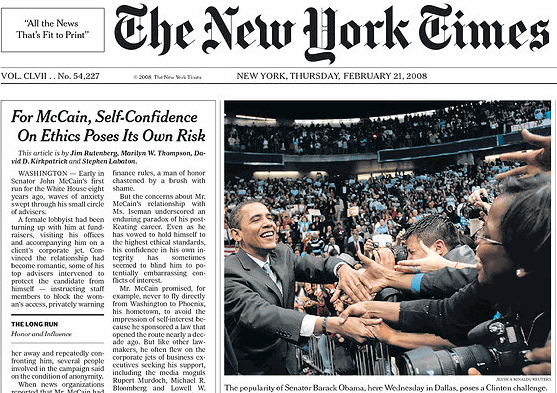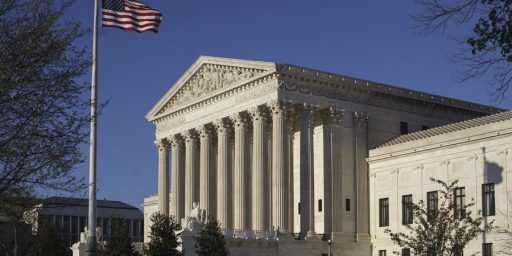Libertarians for Obama?
 Megan McArdle explains why she prefers Barack Obama to John McCain despite the former’s protectionism and “his insanely bad economic ‘patriot act.'”
Megan McArdle explains why she prefers Barack Obama to John McCain despite the former’s protectionism and “his insanely bad economic ‘patriot act.'”
I might not vote for Obama; I will not vote for McCain. There are some things more important than the economy, and free speech is among them. Yes, I don’t like Obama’s stance on the Second Amendment, but the difference is, the president has little wiggle room right now on the second, while McCain might do serious further damage to the first, or the fourth. I dislike the steps Obama is willing to take in order to achieve his goals of economic equality. But these are as nothing to the notion that citizens have to be protected from information because Big Daddy John thinks we’ll get bad ideas in our heads.
To be sure, pure libertarians can’t be thrilled with either choice. Ideologues who want to participate in real world politics have to, therefore, prioritize and it’s reasonable enough to prefer trading off free trade for free speech rather than vice-versa if those are the available alternatives.
It’s far from clear, though, that this is the situation we’d face in an Obama-McCain contest.
I haven’t read all of Megan’s posts on the subject but I gather that her principal objection to McCain on free speech is McCain-Feingold. While I share her vehement objection to that legislation, and even agree that its limitations on campaign contributions and the purchase of attack ads by outside groups constitute an unconstitutional infringement on free speech (a position with which the Supreme Court, unfortunately, disagrees), it’s absurd to characterize McCain’s motivation as “the notion that citizens have to be protected from information because Big Daddy John thinks we’ll get bad ideas in our heads.”
McCain, presumably scarred by his own experience with the Keating Five scandal, feared the corruption of a system where large donors have far more influence than average citizens and thought it was undermining the public’s confidence in the legitimacy of the system. From a March 2001 floor speech:
Madam President, the many sponsors of this legislation have but one purpose: to enact fair, bipartisan campaign finance reform that seeks no special advantage for one party or another, but that helps change the public’s widespread belief that politicians have no greater purpose than their own reelection and to that end we will respond disproportionately to the needs of those interests that can best finance our ambition, even if those interests conflict with the public interest and with the governing philosophy we once sought office to advance.
The sad truth is, Madam President, that most Americans do believe that we conspire to hold on to every single political advantage we have lest we jeopardize our incumbency by a single lost vote. Most Americans believe that we would let this nation pay any price, bear any burden for the sake of securing our own ambitions, no matter how injurious the effect might be to the national interest.
And who can blame them? As long as the wealthiest Americans and richest organized interests can make the six- and seven-figure donations to political parties and gain the special access to power that such generosity confers on the donor, most Americans will dismiss the most virtuous politician’s claim of patriotism.
The opponents of reform will ask: If the public so distrusts us and so dislikes our current campaign finance system, why is there no great cry in the country to throw us all out of office? They will contend — and this point is disputable — that no one has ever lost or won an election because of their opposition to or support for campaign finance reform.
Yet public opinion polls consistently show that the vast majorities of our constituents want reform and believe our current system of campaign financing is terribly harmful to the public good.
But, the opponents observe, they do not rank reform among the national priorities they expect their government to urgently address. That is true, Madam President, but why is it so?
Simply put, they don’t believe it will ever be done, they don’t expect us to adopt real reforms, and they defensively keep their hopes from being raised and their inevitable disappointment from being worse.
The public just doesn’t believe that either an incumbent opposing reform or a challenger supporting it will honestly work to repair this system once he or she has been elected under the rules, or lack thereof, that govern it. They distrust both. They believe that whether we publicly advocate or oppose reform, we are all working, either openly or deceitfully, to prevent even the slightest repair of a system that they believe is corrupt. [emphasis mine]
Now, I think this fear was overblown and the reaction to it unwise and ultimately futile. But let’s not characterize it as an actual opposition to free speech even if its provisions created that result. Rather, he’s taking Madison’s fear of factions too far.
Further, given a choice between McCain and Obama on this issue, I’m not sure why a libertarian would chose Obama.
Yes, McCain’s name appears, along with Russ Feingold’s, in the law’s informal name. But Obama hasn’t exactly campaigned on overturning it. Precisely two Democrats were among the 40 Nay votes (Obama was not among them, since he hadn’t yet been elected to significant political office way back in 2004) making the election of Obama an unlikely avenue for reform in a positive direction.
We don’t have to rely on conjecture. Take a look at Obama’s issues page under Ethics:
Support Campaign Finance Reform: Obama supports public financing of campaigns combined with free television and radio time as a way to reduce the influence of moneyed special interests. Obama introduced public financing legislation in the Illinois State Senate, and is the only 2008 candidate to have sponsored Senator Russ Feingold’s (D-WI) tough bill to reform the presidential public financing system.
Now, in all fairness, there are many things on that page for libertarians to like, including some sunlight provisions that would give the public more information on a variety of issues. But Obama is, if anything, more inclined to limit speech than McCain on the particular score that so vexes Megan — and take money from private business owners to do it, to boot!
I haven’t been able to find a definitive public statement by Obama on the Fairness Doctrine, which many prominent Democrats want to revive. He gives a hint in that direction, though, on his Technology page:
Encourage Diversity in Media Ownership: Barack Obama believes that the nation’s rules ensuring diversity of media ownership are critical to the public interest. Unfortunately, over the past several years, the Federal Communications Commission has promoted the concept of consolidation over diversity. Barack Obama believes that providing opportunities for minority-owned businesses to own radio and television stations is fundamental to creating the diverse media environment that federal law requires and the country deserves and demands. As president, he will encourage diversity in the ownership of broadcast media, promote the development of new media outlets for expression of diverse viewpoints, and clarify the public interest obligations of broadcasters who occupy the nation’s spectrum. An Obama presidency will promote greater coverage of local issues and better responsiveness by broadcasters to the communities they serve.
Certainly, this sounds like less, not more, freedom of speech and the press.
Many libertarians, faced with a choice between two non-libertarian candidates, will almost certainly vote for Obama. They may do it out of visceral reasons or attraction to him as a personality. They may do it on abortion, drug policy, homosexual rights, or a less militaristic foreign policy. But they’re not going to do so, if they’re honest with themselves, on free speech or free trade.
Image: McHenry County Blog via Google





Absolutists make my stomach roil. As a matter of law it is simply untrue that McCain-Feingold is an infringement of free speech. If those who are so exercised about McCain-Feingold wish to extend their rights under the First Amendment to include that area they should employ their other rights, namely freedom of assembly and the right to petition the government, to do so.
The reality is that speech is freer in the United States today than at any time in our history, sometimes to our chagrin. Which, I guess, is as it should be.
Now that is cool.
In any event, I’m glad to see that Obama is picking up the 0.001% voting block that’s libertarian.
roflmao
Would you like to elaborate on how you see free speech diminished by encouraging diversity in media ownership?
Yea, I’d be really interested in Jame’s theory about how more diversity in media ownership leads to less freedom of speech and the press.
It seems to me that encouraging diversity in media could be more or less restrictive of free speech, depending on exactly how it is done. For example, creating new classes of radio stations might encourage diversity without restricting free speech.
Umm, read the sentences after that fancy title please.
When a president seeks to “clarify the public interest obligations of broadcasters who occupy the nation’s spectrum,” he tells them what they must broadcast. Apparently, it’s going to be “greater coverage of local issues and better responsiveness by broadcasters to the communities they serve.”
One can argue whether that’s a reasonable trade-off for getting the spectrum. But it’s as much a limit on speech as BCRA.
Obama supports campaign finance reform with the backing of two billionaires. One, the grandson of a slave owner and Obama has spent the most money ever on commercial advertising during a campaign. He has taken more donations from executives from Exxon Mobile and others, worse than any other candidate. He has taken money from the nation’s largest nuclear power company and he has introduced state legislation for them as reported by Democracy Now. Some reform
Obama encourages media diversity. You can understand more about his ideas of diversity by visiting his Trinity Church where they are praising Farrakhan. The media should report more but they are enjoying the ratings and adds. Some diversity.
Anybody thinking that bringing back the “fairness doctrine” will help free speech, would be gullible enough to vote Democrat on the free speech issue.
The last time I looked, the election was about a President, not a dictator. I realize that eight years of Bush might create this confusion. Remember? We have a constitution and a system of checks and balances, and there’s no good reason to expect the next President to disrespect these institutions to the extent the current one has.
So, let me get this straight James. You take a publicly own resource and you let people make money off of it and you think that placing *any* restrictions or guidelines on what they say as a restriction of “free speech”. No one is *forcing* these capitalists to buy up the spectrum and use it. You haven’t restricted their free speech as last time I checked owning a portion of the spectrum and blathering about Michelle Obama’s patriotism isn’t a protected constitutional right of free speech. Rather, it is an exchange of value. Publicly owned resources should serve the public’s interest and that’s not a “restriction” of constitutionally guaranteed rights.
I mean, there’s a zillion ways to say what you want to say. Believing that there’s some right to ownership over public resources without any restrictions what so ever is quite a bizarre theory.
Geebus.
Oh, and what grampagravy said. 8 years of right wing rule has produced an environment far worse than anything dreamt by the left wing PC crowd. I mean, even you, James, get all in a huff when something is said by Michelle Obama that doesn’t fit you’re own politically correct speech standards. And you’re a relatively moderate bloke.
All I said about it was that it was a damned stupid thing to say in the context of a political campaign to lead America.
That’s not a “huff,” it’s just political analysis. Which, apparently, the Obama campaign shared since they walked it back, pronto.
On your main point, though, the extent to which one wants to impose requirements for airing certain types of political speech on broadcasters is debatable. That doing so restricts speech isn’t.
My own preference would be to auction off the bandwidth to the highest bidder, by the way, and leave the content largely unregulated. Given that we give away a valuable resource for free, it’s natural that government is going to put some strings on it. I’d prefer more freedom and more cash, personally.
Surrender the bandwidth to the tender mercies of the highest bidder.
My preference would be to see MSM separated completely from any and all outside for-profit interests.
This is the path that leads directly to a tyranny by the wealthy. This is 12 orders of magnitude more dangerous to free speach the anything in the McCain-Feingold act.
But the wealthy — the phenomenally wealth, in fact — own the broadcast bandwidth now. I’m simply suggesting that we charge them for it.
Charging the phenomenally wealthy for tyranny does nothing to improve the situation–or, is everything for sale? Why not just convert to an aristocracy as long as they toss us a few coins now and then.
.
Which would seem to ignore the massive investment in developing it, all of which comes back into the economy. We’re talking the hardware… both the transmission and networking, plus the software investment… IE; the programming.
Consider also, the billions in electronic sales which would be impossible but for that investment. I’d say it’s paying for itself.
Oh… and for the record, the ‘Fairness” doctrine, isn’t.
(Harumph)
This assumes, of course that the public has no choices in what they will and will not watch. That would be a tyranny. NAd certainly, it’s how we ended up with most of the MSM in the last 40 years out of control leftist.
However the reality is, there is such a thing as a free market. Technology, combined with that free market, has provided us with a great deal of alternatives, to the point where only around 15% of people watching television get it by way of the bandwidth in question. Most get theirs by way of the bird, or the cable, anymore.
Hence, Fox.
Get the picture?
Get the picture?
What’s your address, Bithead? I’m going to send you a complimentary copy of No-one Makes You Shop at Walmart.
On your main point, though, the extent to which one wants to impose requirements for airing certain types of political speech on broadcasters is debatable. That doing so restricts speech isn’t.
Ah, so now you’re confusing two concepts. One is the general “restriction” where by someone imposes conditions of acceptance on a party in a contract of *choice*. The other is the constitutionally protected right of “free speech”. Obviously any conditions are restrictions. The question is whether these violate or “restrict” their right to “free speech” as it is understood as a constitutional right.
Obviously, it doesn’t.
I’m not claiming it is, merely that Obama is “more inclined to limit speech” on such matters than McCain.
Wow, you really should have been a politician. What you’re implying is the limitation of constitutionally protected free speech. Indeed, as this entire post is about the touch points of civil libertarians, this is hardly an accident. Rather it is a calculated strategy of implying – heck, coming right out and saying – that Obama is “more inclined” to limit constitutionally protected free speech which is demonstrably and objectively false given the evidence you are citing.
Top marks, as always. However, it’s hard to know whether to classify this as a cynical lie, simply a clever fraud. If you really do think this is constitutionally protected free speech, the I guess it’s simply delusional argumentation.
As they say, “ignorance is a condition, stupidity is a strategy”.
Libertarians believe in liberty for its own sake. To the extent the Constitution protects it, it’s a happy accident.
I think the restrictions imposed by McCain-Feingold are unconstitutional; the Supreme Court disagrees. I don’t think most of the basic rules required of broadcasters are unconstitutional, although I do think some of them are unwise; some of them do, however, infringe on a libertarian concept of speech.
The Fairness Doctrine, which many prominent Democrats want to reinstate, strikes me as unconstitutional but the Supremes never ruled it to be so. (I’m not sure there was ever a case brought on it.)
Libertarians believe in liberty for its own sake. To the extent the Constitution protects it, it’s a happy accident.
I suppose that’s a coherent argument as any can be made wrt libertarians.
infringe on a libertarian concept of speech.
Okay, fair enough. It’s nice to be precise and note that this is not the same as the constitutionally protected form of free speech. Despite your opening sentence above, I think that is distinction lost in the minds of many – especially libertarians, but that’s a different matter.
strikes me as unconstitutional but the Supremes never ruled it to be so.
It’s hard to see how. The ability to require restrictions and additional behavior in exchange for the use of a public resource has been upheld repeatedly by the Supreme Court in many different forms. The spectrum has been long deemed a public resource and consequently it would be quite the surprising ruling to find that it’s unconstitutional – even by this supreme court.
One can note that the internet isn’t considered to be a public resource in the same way as the spectrum is and all attempts at regulating it as such have been clearly denied. Hell, we can’t even tax trade on it. I think this makes a clear object lesson as to where the constitutional line is drawn and why.
Agreed and in some senses it must be. We need to regulate who broadcasts on what frequency, for example, or we’d have anarachy. But the 1st Amendment also states rather clearly that Congress can’t abridge freedom of the press. Requiring equal time for opposing views certainly has, at very least, a hell of a chilling effect.
Requiring equal time for opposing views certainly has, at very least, a hell of a chilling effect.
It’s hard to see how. Are you making the argument that it’s “too expensive” and therefore they wouldn’t be putting out any views at all? Are you arguing that somehow requiring opposing views – in and of itself – is chilling? I mean, that just doesn’t even make sense. Are you arguing that requiring opposing views would stop the original views from being made?
I think if you’re going to make the charge that requiring opposing views would have a chilling effect, you should describe just what your theory is.
Again, no one is forcing them to make use of the spectrum. They’re doing so to get value. The public has a right to extract concessions in return. Money isn’t the only concession, and at least on the liberal side of thought, requiring equal time for opposing views is something that is a good thing for society.
One can certainly argue whether or not requiring opposing views is good for society and whether it is a mechanism we should require in exchange for using the spectrum. However, to claim that requiring opposing views has a “chilling effect” seems completely non-sensical and an unsupportable assertion.
A “chilling effect” on what? The ability to make unrestricted profit off a public resource? I don’t recall that being a constitutionally protected right.
Here’s another one I would like to see you elaborate on. What exactly would that “chilling” effect be?
Since when did more than one point of view (that of the highest bidder) become a detriment to rational discourse?
I find McArdle’s reasoning utterly bizarre. McCain should be punished for authoring legislation by voting for someone who would have almost certainly supported said legislation?
As for why libertarians would vote for Obama, “Iraq” is the first thing that comes to mind.
Seems pretty silly to suggest an even weighting for the first ten amendments to the constitution and an overweight of those things compared to everything else. Excessive taxation and over-regulation weigh a whole lot more heavily on what practical libertarians should care about more about than laws intended to prohibit people from buying an election or a neutron bomb.
The Fairness Doctrine was upheld by the Supreme Court in Red Lion v. FCC.
The whole thing is so 20th century. There is no shortage of opportunities for exposure in this era of cable, Internet, etc etc. What is crazy is that we give away billions of dollars worth of spectrum to broadcasters, like they are doing us some kind of “service” to pipe TV to the 15% of Americans who still don’t have cable. If we sold the spectrum instead the market could decide whether that is really the best use of all of that bandwidth. I could be persuaded otherwise, but going into the discussion I’m not terribly sympathetic to broadcaster complaints about overregulation after they use regulation to pick the pockets of the taxpayers for their free airwaves.
On campaign finance there is probably not a nickels worth of difference between them.
Allowing consolidation of broadcast and print media to the point where virtually all of it is controlled by 5 parties does not lead to a freer media in any sense that benefits the general populace.
An arena of free speech where Obama definitely has an upper hand that should matter to people here is on net neutrality (Obama for, McCain against).
Another would be on keeping and expanding Patriot Act provisions where again Obama is definitely the one in favor of more 1st and 4th amendment protections than is McCain.
I really don’t see how anyone could think McCain is better on any of the 1st 10 other than the second, but particularly not the 1st or 4th.